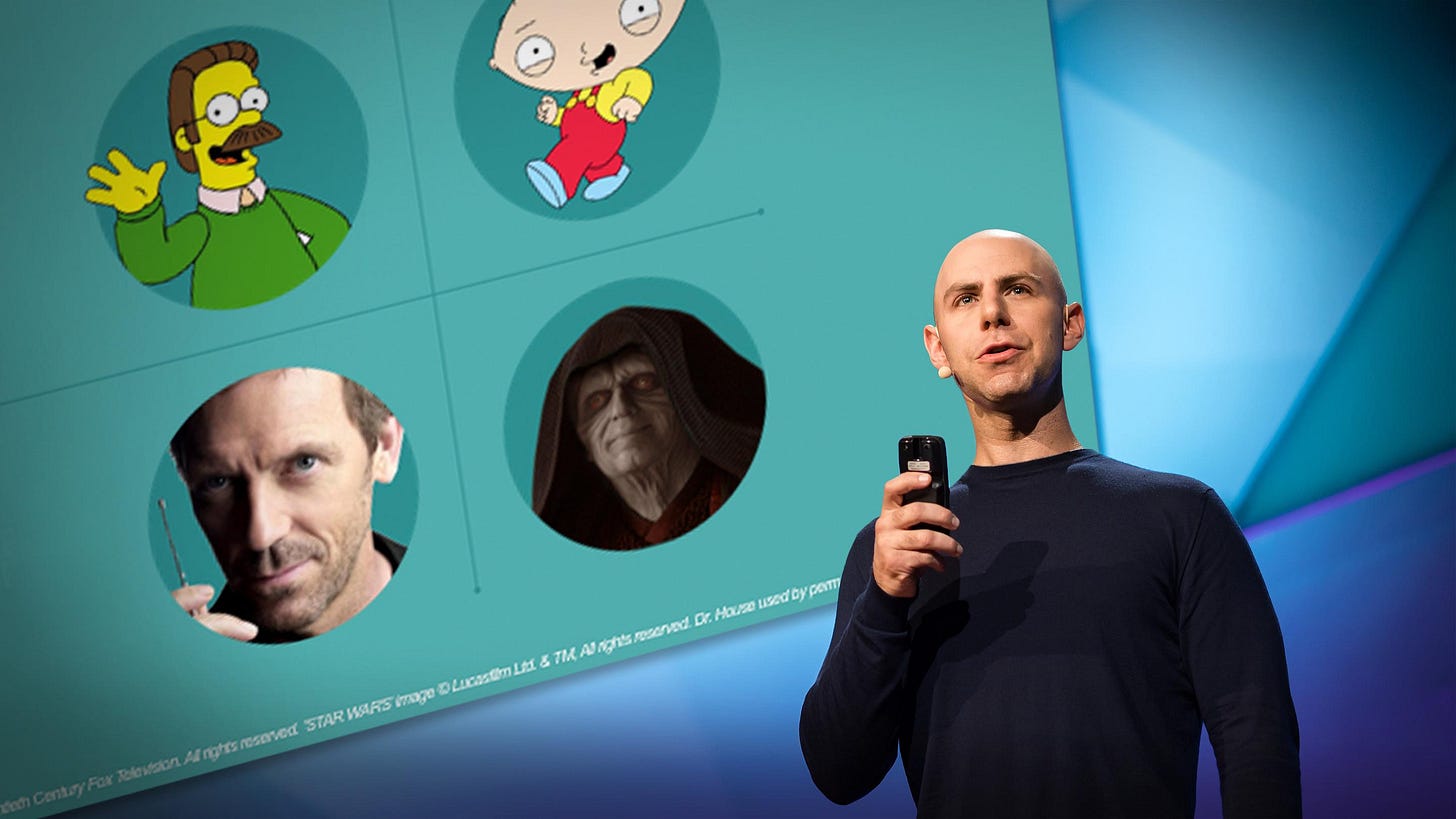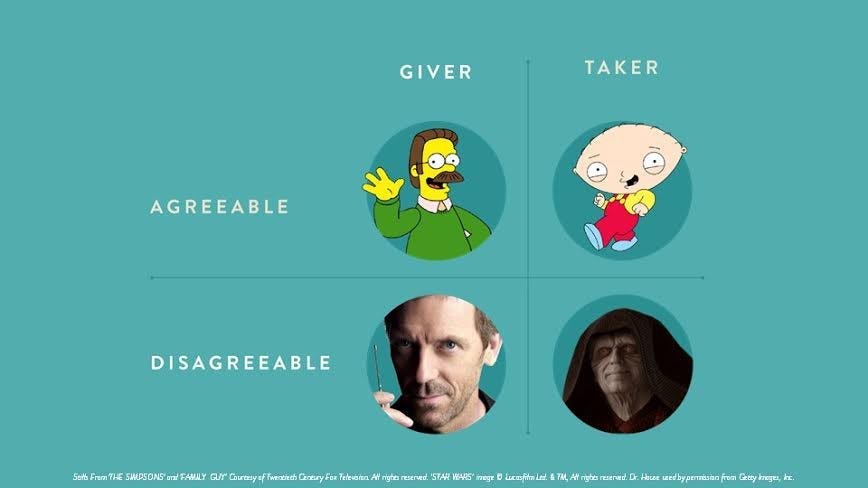On Keeping Your Eyes on the Prize, The Fine Art of Talking to Strangers, and Rooting for the Givers
Monday #18 with M
Hi, and welcome to Monday #X with M. Each week, I’ll share some topics I’ve come across recently—an idea, article, or story—that caught my attention. I’ve learned so many interesting things from the people who’ve shared what they’ve found useful, and I consider that an act of kindness. This is my weekly care package to you, filled with fun and/or thoughtful discoveries, and sometimes a bit of venting about the craziness of the world to start your week on a good note.
I’ve chosen the #X format because I sometimes struggle with consistency, and I thought seeing the number grow each week would motivate me to keep going. Let’s get into it!
Spotlight Three
I. Awkward Silence and Other Nightmares

Human beings are social creatures, that’s true. But not all of us are cut out for social interactions, and some of us find it so daunting that we prefer to avoid it as much as we can help it. But then there are some of us, yours truly included, who find the awkward silence even more uncomfortable than trying to start a conversation with a complete stranger. That’s why when I saw this article on the Guardian, I thought to myself, Ah! This is right up my alley. The article offers some practical tips on how to start up a conversation, how to navigate it, and when and how to get yourself out of one that turns out to be a mistake.
Don’t assume it will be awkward: This is an important one for me. You’d be surprised how many times you can tell the other person was thinking the exact same thing, and how both of you will be surprised at how different it went.
Act confident, even if you don’t feel it: Or as they say, fake it until you make it. “There’s a difference between appearing confident and being comfortable,” says Elaine Swann, a lifestyle and etiquette expert, and founder of the Swann School of Protocol. Do not worry about seeming cool and fun. That’ll come out naturally if you have those qualities, of course.
Ask questions: To me, nothing shows more enthusiasm and attention than asking relevant follow-up questions. It’s the easiest way to show the other person you were paying full attention and to keep the conversation going.
Small talk is fine: Okay, this one is hard for me. I find ‘How was your weekend?’ the most annoying question in the whole world. But turns out it’s a great way to get people to interact with you and get out of the meh feeling of Monday morning. If it’s working, it’s worth a shot. “But just because you’re keeping a conversation light doesn’t mean it has to be boring.” The article suggests thinking about some topics if you know the crowd you might be meeting.
Practice! I can swear by this one. The more you make yourself get into these situations and take the risk, the more vigilant and adept you’ll become in spotting the people that could turn out to be great communicators.
Know when to make an exit: Don’t get cocky and think you are some sort of stranger-whisperer and you have the magic ability to talk to everybody. Some people don’t like talking to others, and there is nothing you could do about it. Just get the hint and walk away.
II. Closer Than You Think
Emily Balcetis is a social psychologist who explores perception, motivation, goal-setting, and decision-making on both conscious and nonconscious levels. In this TED talk, she explains why some people struggle more than others to keep off the pounds. She presents research that highlights one of the many factors: our vision. In this informative talk, she shows how, when it comes to fitness, some people quite literally see the world differently and offers a surprisingly simple solution to overcome these differences.
This 14-minute video was a refreshing and new perspective on how we see the world in our unique way, or as she says, through “our own mind’s eye,” and how this results in different worldviews. Based on the research, people with a higher waist-to-hip ratio who are considered less fit were asked to estimate the distance between where they stood and a finish line. They consistently saw the distance as longer than fit people did. Interestingly, this went hand in hand with motivation. They later found that motivated, unfit people might actually see the finish line as closer than fit individuals.
So the researchers began thinking about strategies to help people overcome the tricks their mind’s eye plays on them. They came up with the “keep your eyes on the prize” strategy, not just as a motivational catchphrase but as a literal instruction. Participants were asked to focus on the finish line and try not to look at anything else around it. “People who kept their eyes on the prize saw the finish line as 30 percent closer and actually moved 23 percent faster than people who looked around as they naturally would.”
She finishes the talk by expanding this finding to our social interactions and how, when we feel down and unmotivated, the finish line in anything can seem farther away. I’ve used this strategy at work many times, especially on days when everything felt unreasonably hard. Keeping your eyes on the prize, whatever that prize means to you, can make it easier to get through. Perception is subjective, after all.
III. Snakes, Sharks, and the Case for Kindness
Let me start by saying that I think Adam Grant is a great presenter and, I’d like to believe, a great person altogether. I tend to agree with his worldview and most of his conclusions. In this talk, he discusses two major groups of people you’ll find in your organization: Givers and Takers. Pretty self-explanatory, but it becomes more interesting when he gets into research-backed data on how important it is to have more Givers on your teams and how you should protect them, as they tend to prioritize others over themselves.
Here’s my take on what he has shared in this video:
Protect Givers from burnout: I cannot emphasize this enough. Maybe the most important thing you can do to keep Givers on your team is to take care of them and remind them they don’t need to do everything for everyone. Sometimes, just nudging people in the right direction counts as a great help.
Encourage help-seeking: Givers rarely ask for help, mostly because they don’t want to be a burden or add to anyone’s plate. It’s important to create a culture where help-seeking is encouraged so they realize there is nothing wrong with it.
Get the right people on the bus: Grant says the negative impact of a Taker on culture is usually double or triple the positive impact of a Giver. Let even one Taker into a team, and the Givers will stop helping. They’ll say, "I'm surrounded by a bunch of snakes and sharks. Why should I contribute?" Whereas if you add one Giver to a team, you don’t get an explosion of generosity. So how do you fix that? Grant says effective hiring and team building is not about bringing in the Givers; it’s about weeding out the Takers.
Then he goes on to explain that we might naturally think being a Giver or a Taker is directly related to being agreeable or disagreeable, and that is not the case.
He demonstrates this with a great two-by-two chart:
Agreeable Giver: He uses Flanders as an example—one of the friendliest and most compassionate characters.
Disagreeable Taker: That one’s easy to spot. We’ve all had jerk co-workers and managers. The Emperors of the world.
Disagreeable Giver: The Dr. House types. Underrated, gold-hearted people who have others' best interests at heart but not always the best way of showing it. I’ve worked with many of these in my life, and once you get past the tough exterior, there lies a gem.
Agreeable Taker: Oh, these are the snakes to watch, the backstabbers, if you will. That co-worker who always smiles at you but the smile never reaches their eyes. The manager who pretends to care about your wellness but only cares about how much you’re taking off their plate. I personally find this group the most challenging to deal with.
I believe that the most meaningful way to succeed is to help other people succeed. And if we can spread that belief, we can actually turn paranoia upside down… The great thing about a culture of givers is that's not a delusion, it's reality. I want to live in a world where givers succeed, and I hope you will help me create that world.
You and me both, Mr. Grant. You and me both.
On a Brief Note
Twenty years of Pride and Prejudice
This year marks the 20th anniversary of Pride and Prejudice, the Keira Knightley and Matthew MacFadyen version. I was having this self-debate a couple of weeks ago and I am still going between him and Colin Firth for the best Mr. Darcy of all time. In this version, there is a particular scene when Mr. Darcy helps Elizabeth get on the carriage after she has come to fetch her sick sister from Mr. Bingley’s house. “But when he touches her, something happens. She looks down, her gaze lingering on his gesture. As he walks away, the camera captures Darcy’s hand. His fingers stretch outward like an impulsive, unconscious tic. Her touch is almost too intense for him to handle.” Twenty years have passed, and fans like myself are still swooning about this simple act. It’s so inexplicably romantic.
The Residence
This is the newest production from Shondaland, the creator of series like Grey’s Anatomy, Scandal, How to Get Away with Murder, Bridgerton, etc. A suspicious death happens in the White House during a state dinner, and Detective Cordelia Cupp is summoned to figure it out. Say what you want about Shonda Rhimes, but undoubtedly her productions are entertaining, rhythmic, and engaging, and this mini-series is no exception.
Words Worth Sharing
If you're 37... Instead of regretting that you can't wake up age 18 again, pretend to yourself that you're 90 and you've woken up age 37 again, and that you get to magically, wonderfully have the next 50 years again.
Unknown
This is it for this week’s edition of Monday #X with M. If something here made you think, smile, or sparked your curiosity, consider sharing it with someone who might enjoy it too. You never know whose day you might brighten with a thoughtful word or idea—it’s a small act of kindness that can go a long way. See you next Monday!










As someone who proudly identifies as a Dr. House type, minus the Vicodin, hopefully, I’ve learned it’s not about being nice, it’s about being right for the people who count. "Everybody lies” might be House’s golden rule, but spotting the Givers from the snakes is half the battle. Protect the Givers, they’re worth the trouble.